人教版小学英语五年级上册知识点总结
小学五年级人教版英语上册知识点总结

千里之行,始于足下。
小学五年级人教版英语上册知识点总结以下为小学五年级人教版英语上册的知识点总结:1. 单词拼写:在该册教材中,学生需要掌握一些常见的英语单词拼写,包括动物、食物、家庭成员、学科等等。
2. 问候与自我介绍:学生需要学习一些基本的问候语和自我介绍的表达方式,例如“Hello!”、“How are you?”和“My name is…”等等。
3. 数字和计数:学生需要掌握基本的数字和计数的方法,包括数字1-100的读法和使用方法,以及一些基本的计数方法,如“one, two, three…”和“first, second, third…”等等。
4. 时间和日期:学生需要学习如何询问和回答时间和日期,包括询问日期的方法和回答“What is the date today?”和“How old are you?”等等。
5. 学科和学校事务:学生需要学习一些与学科和学校事务相关的词汇,如“math, English, science”等等。
还需要学习表达自己的课程表和学校活动的方式。
6. 构词法:学生需要学习一些常见的词根和词缀,以了解词语的构造和含义。
例如,“un-”表示否定,“-er”表示人,“-ly”表示程度或方式等等。
7. 家庭成员和家庭活动:学生需要学习家庭成员的称呼和描述,如“father, mother, brother, sister”等等。
还需要学习描述家庭活动的方式,如“go shopping, have dinner”等等。
第1页/共2页锲而不舍,金石可镂。
8. 介词和介词短语:学生需要学习一些常见的介词和介词短语,以了解它们与其他词汇和短语的关系,如“in, on, under, between”等等。
9. 基本的语法知识:学生需要学习一些基本的语法知识,如名词的单复数形式,动词的过去式和进行时态,还有一些基本的句型结构,如主谓结构和主谓宾结构等等。
10. 听力和口语训练:学生需要通过课堂上的听力练习和口语训练来提高听力和口语能力,以便更好地理解和使用英语。
人教版小学英语五年级上册各单元知识点
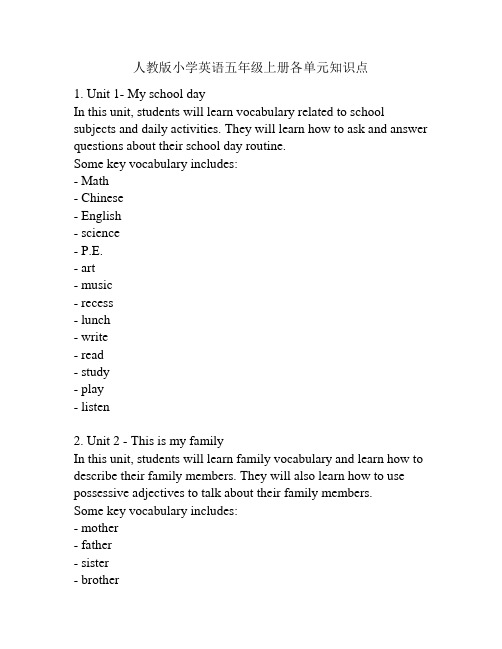
人教版小学英语五年级上册各单元知识点1. Unit 1- My school dayIn this unit, students will learn vocabulary related to school subjects and daily activities. They will learn how to ask and answer questions about their school day routine.Some key vocabulary includes:- Math- Chinese- English- science- P.E.- art- music- recess- lunch- write- read- study- play- listen2. Unit 2 - This is my familyIn this unit, students will learn family vocabulary and learn how to describe their family members. They will also learn how to use possessive adjectives to talk about their family members.Some key vocabulary includes:- mother- father- sister- brother- grandmother- grandfather- aunt- uncle- cousin- daughter- son- possessive adjectives (my, your, his, her)3. Unit 3 - At the zooIn this unit, students will learn vocabulary related to animals and their habitats. They will also learn how to talk about what animals can do (i.e. run, swim, fly, etc.).Some key vocabulary includes:- lion- tiger- elephant- giraffe- monkey- panda- kangaroo- penguin- habitat (forest, desert, ocean, etc.)- can/can't4. Unit 4 - My homeIn this unit, students will learn vocabulary related to the rooms in a house and furniture. They will also learn how to use prepositions to describe where things are in a room.Some key vocabulary includes:- living room- kitchen- bedroom- bathroom- dining room- sofa- table- chair- bed- closet- prepositions (on, under, next to)5. Unit 5 - My scheduleIn this unit, students will learn how to talk about their daily schedules and activities. They will also learn vocabulary related to time and daily routines.Some key vocabulary includes:- wake up- brush teeth- take a shower- go to school- come home- eat dinner- do homework- bed time- time (hour, minute, second)6. Unit 6 - My hobbiesIn this unit, students will learn how to talk about their hobbies and interests. They will also learn vocabulary related to differenthobbies and sports.Some key vocabulary includes:- play soccer- dance- sing- draw- swim- ride a bike- play the piano- watch TV- read books- hobby- interest7. Unit 7 - Our worldIn this unit, students will learn vocabulary related to different countries and cultures. They will also learn how to ask and answer questions about different places in the world.Some key vocabulary includes:- country- flag- language- symbol- landmark- continent- questions (What's the capital of...? What language do they speak in...?)8. Unit 8 - Let's celebrate!In this unit, students will learn vocabulary related to holidays andcelebrations. They will also learn about different traditions and customs around the world.Some key vocabulary includes:- Halloween- Thanksgiving- Christmas- New Year's Day- Valentine's Day- Easter- tradition- custom- celebrateOverall, these units will help students develop their language skills in various areas such as vocabulary acquisition, grammar usage, and communication. By the end of the fifth grade, students will have a foundation of English language that will prepare them for more complex language use in the future.In addition to the vocabulary and grammar covered in these eight units, there are also important language skills that students will develop, such as reading comprehension and writing ability. Throughout the units, students will be completing various reading activities to help them understand and contextualize the new vocabulary and grammar they are learning. They will also be practicing writing skills, such as paragraph writing and short answer responses.Reading comprehension is a vital skill for English language learners, as it helps students to understand and interpret new information. In each unit, there will be reading passages related to that unit's topic. For example, in Unit 3, students may read aboutdifferent animal habitats and learn how animals adapt to their environment. Reading comprehension activities may include reading comprehension questions, matching exercises, and writing exercises. By the end of each unit, students should have a solid understanding of the reading material and be able to answer questions related to the content.Writing is another essential skill that students will develop throughout these units. Writing exercises will be incorporated into each unit, helping students to practice writing in English and apply the new vocabulary and grammar they are learning. Some writing exercises may include writing short paragraphs about their hobbies or describing their family members. By the end of the fifth grade, students should be able to write coherent paragraphs with proper grammar, spelling, and punctuation.Speaking and listening skills will also be developed through group and partner activities in each unit. Students will be encouraged to ask and answer questions in English, and engage in conversations with their peers. They will also have opportunities to give short presentations on topics related to each unit, which will help them develop their public speaking skills.Overall, these eight units are designed to provide a comprehensive language learning experience for students in fifth grade. By the end of the program, students should be able to understand and use everyday English vocabulary and grammar in a variety of contexts. They should also be able to read and comprehend short passages, write short paragraphs independently, and engage in conversations and presentations with their peers. It is important to note thatlanguage learning is a gradual process, and students will vary in their language proficiency at the end of the program. However, with consistent practice and dedication, students in fifth grade will be well-prepared for more advanced language learning in the future.。
小学五年级人教版英语上册知识点总结
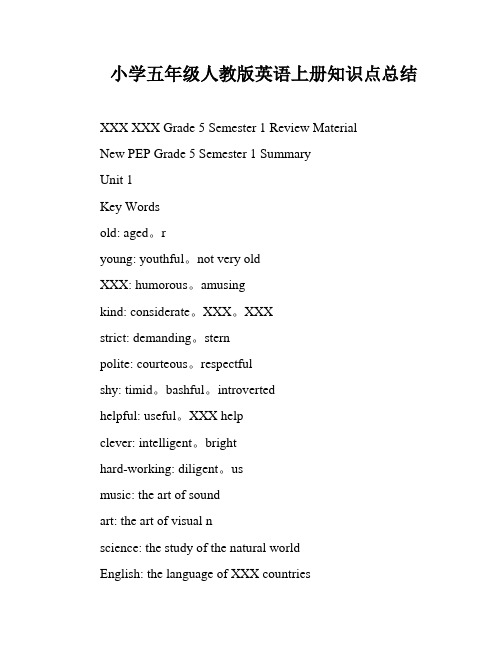
小学五年级人教版英语上册知识点总结XXX XXX Grade 5 Semester 1 Review MaterialNew PEP Grade 5 Semester 1 SummaryUnit 1Key Wordsold: aged。
ryoung: youthful。
not very oldXXX: humorous。
amusingkind: considerate。
XXX。
XXXstrict: demanding。
sternpolite: courteous。
respectfulshy: timid。
bashful。
introvertedhelpful: useful。
XXX helpclever: intelligent。
brighthard-working: diligent。
usmusic: the art of soundart: the art of visual nscience: the study of the natural worldEnglish: the language of XXX countriesXXX: the study of numbers and their propertiesChinese: the language of Chinasometimes: nally。
now and thenrobot: a machine that can perform XXXspeak: to use a language to communicateKey XXX1."Who's your art teacher?" - "Mr。
Jones."2."Is he young?" - "Yes。
he is." / "No。
he isn't."3."What's Wu Yifan like?" - "He's hard-working."4."Ms Wang will be our new Chinese XXX."5."XXX."6."Robin is short but strong."7."He can speak Chinese and English."8."XXX"XXXXXX "y" in words: XXX words。
人教版PEP三起小学英语五年级上册知识点总结
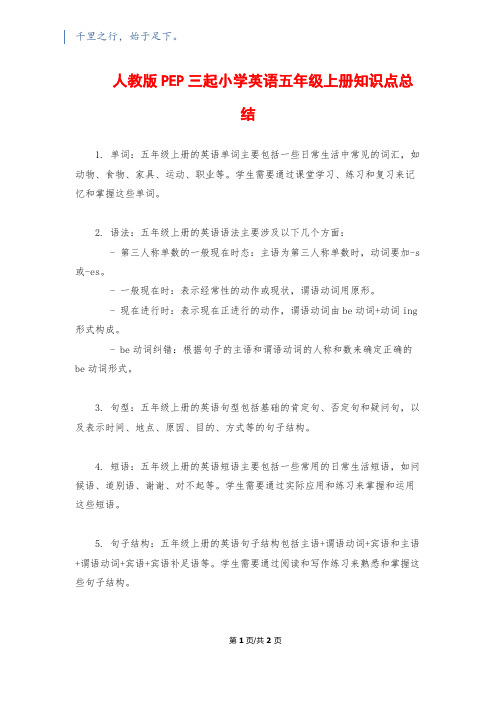
千里之行,始于足下。
人教版PEP三起小学英语五年级上册知识点总
结
1. 单词:五年级上册的英语单词主要包括一些日常生活中常见的词汇,如动物、食物、家具、运动、职业等。
学生需要通过课堂学习、练习和复习来记忆和掌握这些单词。
2. 语法:五年级上册的英语语法主要涉及以下几个方面:
- 第三人称单数的一般现在时态:主语为第三人称单数时,动词要加-s 或-es。
- 一般现在时:表示经常性的动作或现状,谓语动词用原形。
- 现在进行时:表示现在正进行的动作,谓语动词由be动词+动词ing 形式构成。
- be动词纠错:根据句子的主语和谓语动词的人称和数来确定正确的be动词形式。
3. 句型:五年级上册的英语句型包括基础的肯定句、否定句和疑问句,以及表示时间、地点、原因、目的、方式等的句子结构。
4. 短语:五年级上册的英语短语主要包括一些常用的日常生活短语,如问候语、道别语、谢谢、对不起等。
学生需要通过实际应用和练习来掌握和运用这些短语。
5. 句子结构:五年级上册的英语句子结构包括主语+谓语动词+宾语和主语+谓语动词+宾语+宾语补足语等。
学生需要通过阅读和写作练习来熟悉和掌握这些句子结构。
第1页/共2页
锲而不舍,金石可镂。
总的来说,五年级上册的英语主要涉及基础词汇、语法、句型和句子结构等方面的知识点,学生需要通过课堂学习和练习来掌握并应用这些知识点。
部编新人教版小学五年级上册英语第一单元知识点小结

部编新人教版小学五年级上册英语第一单元知识点小结本文档将对部编新人教版小学五年级上册英语第一单元的知识点进行小结。
以下是该单元的主要内容:1. 重点词汇- greet:打招呼;问候- introduce:介绍- name:名字- nice to meet you:很高兴见到你- hello:你好- goodbye:再见- how are you:你好吗2. 重点句型- Hello, my name is [name].(你好,我的名字是[name]。
)- Nice to meet you.(很高兴见到你。
)- How are you?(你好吗?)- I'm fine, thank you.(我很好,谢谢。
)- Goodbye.(再见。
)3. 交际用语本单元的重点是研究基本的问候和介绍用语。
可以通过以下对话来进行练:- A: Hello, my name is Alice. Nice to meet you.- B: Hi, I'm John. Nice to meet you too.- A: How are you, John?- B: I'm fine, thank you.- A: Goodbye, John.- B: Goodbye, Alice.4. 相关练为了巩固所学知识,建议进行以下练:- 跟同学或朋友进行角色扮演对话,练问候和介绍用语。
- 创造不同情景,自己编写对话,运用所学知识表达。
- 背诵和口头练单元中的句子和短语。
这些是部编新人教版小学五年级上册英语第一单元的主要知识点小结。
通过对重点词汇、句型和交际用语的学习和练习,可以帮助同学们更好地掌握这一单元的内容。
祝学习顺利!。
新版人教版小学英语五年级上册期末复习知识点归纳

五年级英语上册期末总复习知识点一.重点单词能听;说;读;写的单词old年老的 young年轻的 funny 滑稽的 kind 和蔼的strict严格的 polite 礼貌的 helpful乐于助人的shy害羞的 hard-working勤奋的 clever聪明的MondayMon. 周一 TuesdayTue. 周二 WednesdayWed.周三ThursdayThu. 星期四 FridayFri. 周五 SaturdaySat. 周六Sunday Sun.周日 weekend 周末 wash my clothes 洗我的衣服 do homework 做作业 watch TV 看电视 read books 读书play football 踢足球sandwiches三明治 salad沙拉 hamburger汉堡 ice cream 冰淇淋tea茶 fresh新鲜的 healthy健康的 delicious美味的 hot辣的sweet 甜的sing 唱;唱歌 song 歌曲 sing English songs 唱英文歌曲play the pipa 弹琵琶 kung fu 功夫;武术 do kung fu 练武术dance 跳舞 draw 画 cartoon 漫画 draw cartoons 画漫画cook 烹调;烹饪 swim 游泳 play basketball 打篮球 play ping-pong 打乒乓球 speak English 说英语clock 时钟;钟 plant 植物bottle 瓶子 water bottle 水瓶 bike 自行车 photo照片;相片front 正面 in front of 在……前面 between在……中间above 在或向……上面beside 在旁边附近behind 在或向后面forest 森林;林区 river 河;江 lake 湖;湖泊mountain 高山;山岳 hill 山丘;小山 tree 树;树木;乔木bridge 桥 building 建筑物;房子;楼房village 村庄;村镇 house 房屋;房子;二、一起来拼读本册课本中学到的语音及单词:发音y/i/ baby宝宝 happy开心的 candy糖果 windy刮风的 sunny晴朗的 sorry 对不起发音/i:/ read 读书 feed 喂养 beef牛肉 feet双脚meet遇见 tea 茶 eat吃发音/a / flower 花 how 如何;怎样cow 奶牛wow 哇 down 向下发音/ / slow 慢的 snow 雪 yellow 黄色 window 窗户发音 /u/ book书 look看 football足球 good好的 cook 烹饪发音 /u:/ balloon 气球 food 食物 zoo 动物园 noodles 面条 cool 酷afternoon 下午发音 /ei/ rainy下雨的 rainbow彩虹 paint涂 wait 等候say 说 way方向 birthday 生日Monday 星期一 today 今天发音/a / house房子 mouse老鼠 sound 声音 count数数三、重点句型:1.--Who’s your art teacher 谁是你的美术老师---Mr Jones.琼斯老师..2.---Is he young 他年轻吗--- Yes;he is. 是的;他年轻.. --- No;he isn’t.不;他不年轻..3.---What’s Wu Yifan like 吴一帆长什么 ---He’s hard-working. 他很勤奋..4.---What’s she like 她长得怎么样 ---She’s kind. 她是亲切的..5.Ms Wang will be our new Chinese teacher.王老师会成为我们的新语文老师..6.He is very helpful at home. 他在家很能干..7.He can speak Chinese and English.他会说汉语和英语..8.He makes me finish my homework.他让我写作业..注意:Be动词is;am;are用法:我用am你用are; is跟着他她它;单数用is;复数要用are..1.----What day is it today今天是星期几---It’s Saturday.今天星期六..2.---What do you have on Thursdays 星期四你们上什么课--- I have math;English and music .我们上数学英语和音乐课..3.---What do you do on Thursdays; Grandpa爷爷;星期四你要做什么 ---I have a cooking class with your grandma.我要和你奶奶去上烹饪课..4.---Do you often read books in this park你经常在这个公园看书吗---Yes;I do.是的 ---No;I don’t.不是5.Look at my picture.看我的图片..6.You look tired. 你看起来很累..注意:合成词day:Monday;Tuesday;Wednesday;Thursday;Friday;Saturday;Sunday1..----What would you like to eat你想吃什么---A sandwich;please.请给我一个三明治..2.---What would you like to drink 你想喝什么--- I’d like some water. 我想喝点水..3.---What’s your favourite food 你最喜欢吃什么食物---Noodles.They are delicious. 面条;面条很好吃..我/他/她最喜欢的食物是鱼..5.I’m hungry/thirsty.我饿了/渴了..6.I don’t like beef but chicken is OK. 我你喜欢牛肉但是鸡肉可以..注意:单复数变化规则:一般情况加s;以o、s、x、ch、sh结尾加es..1.------What can you do for the party;children 孩子们;你们能为联欢会做什么-------I can sing English songs.我会唱英文歌..2.----Can you do any kung fu ;John 约翰;你会武术吗------Yes; I can. 是的;我会武术..No;I can’t 不;我不会..3.I can play ping-pong;but I can’t swim.我会打乒乓;但我不会游泳..注意:1.定冠词the的用法:体育运动前不用the;乐器前面要用the..2. some只用于肯定句;否定句和疑问句中用any.I can do some kung fu.I can’t do any kung fu. Can you do any kung fu1.There is a big bed.这里有张大床..2.There are so many picture here..这里有这么多幅画..3. Your room is realy nice.你的房间真好看..4. My computer is here on the desk.我的电脑在这儿桌子上..5. ----Where is the ball 球在哪里----It’s in front of the dog.它在狗的前面..6. My grandparents have a garden in front of their house.我的祖父母有一个花园在房子前面..7.There are lots of flowers in it.在里面有许多花..注意:There is/are句型构成:There is/are + 物体 + 方位词 + 地方..如:There is a cat in front of the table. 桌子前面有一只猫..There are two pictures on the wall. 墙上有两幅图画..1---Is there a river in the forest; Miss White 怀特小姐;森林里有河吗 ----No;there isn’t. 不森林里没有河..2.----Are there any tall buildings in the nature park自然公园里有高楼吗-----No; there aren’t . 不;自然公园里没有高楼..注意:一般疑问句Is there a/an… Yes; there is. No; there isn’t.Are there any…Yes; there are. No; there aren’t.。
PEP人教版五年级上英语Unit1知识点、考点梳理精编

PEP人教版五年级上英语Unit1知识点、考点梳理精编知识点梳理:1. 单词:表示家庭成员的名词,如father(父亲)、mother(母亲)、brother(兄弟)、sister(姐妹)、grandfather(外祖父)、grandmother(外祖母)、uncle(叔叔)、aunt(阿姨)等。
2. 句型:询问家庭成员的句型,如Who's this/that?(这/那个是谁?),It's my father/mother/brother/sister/grandfather/grandmother/uncle/aunt.(这是我爸爸/妈妈/哥哥/姐姐/外公/外婆/叔叔/阿姨。
)3. 短语:表示家庭关系的短语,如爸爸的妈妈(father's mother)、妈妈的爸爸(mother's father)等。
4. 介词:表示所属关系的介词,如of(的),用于连接家庭成员与其所属关系的词语,如father of(...的父亲)、mother of(...的母亲)等。
考点梳理:1. 听力:辨别家庭成员的听力题,根据听到的描述或问句选择正确的家庭成员名称。
2. 口语:回答关于家庭成员的问题,根据问题回答正确的家庭成员名称。
3. 语法:掌握询问家庭成员的句型,以及回答这个句型的正确用法。
4. 理解:理解描述家庭关系的短语,能够根据短语理解家庭成员之间的关系。
5. 书写:正确拼写家庭成员的单词,注意大小写和单复数的变化。
6. 翻译:能够翻译一些关于家庭成员的句子,包括询问和回答家庭成员的句型,以及描述家庭关系的短语。
注:以上内容为人工智能根据题目和知识点推断出的可能答案,仅供参考。
人教版小学英语五年级上册知识点总结
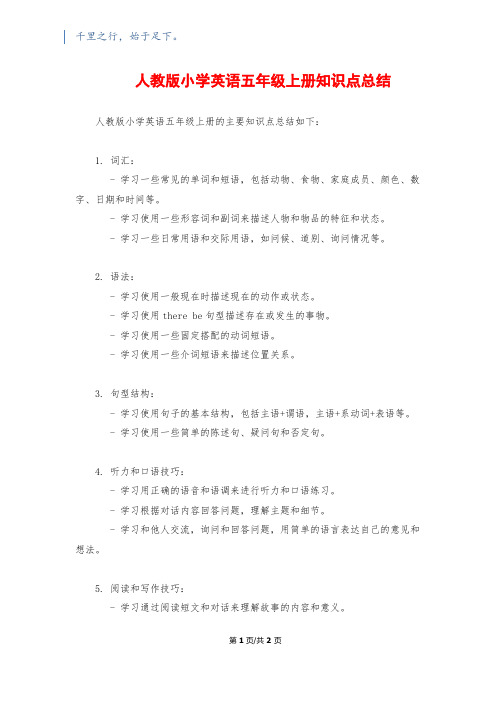
千里之行,始于足下。
人教版小学英语五年级上册知识点总结
人教版小学英语五年级上册的主要知识点总结如下:
1. 词汇:
- 学习一些常见的单词和短语,包括动物、食物、家庭成员、颜色、数字、日期和时间等。
- 学习使用一些形容词和副词来描述人物和物品的特征和状态。
- 学习一些日常用语和交际用语,如问候、道别、询问情况等。
2. 语法:
- 学习使用一般现在时描述现在的动作或状态。
- 学习使用there be句型描述存在或发生的事物。
- 学习使用一些固定搭配的动词短语。
- 学习使用一些介词短语来描述位置关系。
3. 句型结构:
- 学习使用句子的基本结构,包括主语+谓语,主语+系动词+表语等。
- 学习使用一些简单的陈述句、疑问句和否定句。
4. 听力和口语技巧:
- 学习用正确的语音和语调来进行听力和口语练习。
- 学习根据对话内容回答问题,理解主题和细节。
- 学习和他人交流,询问和回答问题,用简单的语言表达自己的意见和想法。
5. 阅读和写作技巧:
- 学习通过阅读短文和对话来理解故事的内容和意义。
第1页/共2页
锲而不舍,金石可镂。
- 学习写简单的日记、便条、邀请函等。
- 学习通过模仿、填空和改写等方式来提高写作能力。
以上是人教版小学英语五年级上册的主要知识点总结,希望对你有帮助。
人教版小学英语五年级上册重点总结

人教版小学英语五年级上册重点总结Unit 1 How do you do?
在这个单元,学生将学习英语的基本问候语和自我介绍。
以下是本单元的一些重点:
•精通基本的问候语和自我介绍;
•学习一些频率副词和简单的现在时态;
•学习简单的数字和计数。
Unit 2 What’s this in English?
学生将学习一些基本的英语单词,如色彩、食物和动物等。
以下是本单元的一些重点:
•学习基本的食物,如苹果、橙子、米饭、面包和牛奶等;
•学习颜色,如红色、黄色、绿色和蓝色等;
•学习一些基本的动物,如鱼、猫、狗、青蛙和鸟等。
Unit 3 How much are these socks?
在这个单元,学生将学习购物和货币。
以下是本单元的一些重点:
•学习一些基本的购物词汇,如衣服、鞋子、袜子和披肩等;
•学习一些货币和数字,如一元、两元、十元、美元和欧元,以及购物对话;
•学习商店的语言和表达方式,如。
小学五年级人教版英语上册知识点总结

新版PEP 五年级上册知识点总结Un it 1old 老的,年纪大的 you ng 年轻的,岁数不大的 funny 滑稽的,可笑的kind 体贴的,慈祥的,宽容的 strict要求严格的,严厉的 polite 有礼貌的,客气的helpful 有用的,愿意帮忙的 clever聪明的,聪颖的hard-work ing 工作努力的,辛勤的music 音乐 art 美术 scie nee 科学Who' syour art teacher一Mr. Jones 琼斯老师。
2. — Is he you ng 他年轻吗—Yes, he is. 是的,他年轻。
一No, he isn ' t.不,他不年轻。
3. — What ' Wu Yifan like吴一帆怎样 一He ' s harWorking.他很勤奋。
4. Ms Wang will be our new Chinese teacher.王老师会成为我们的新语文老师。
5. He is very helpful at home. 他在家很能干。
6. Robi n is short but stron g. 罗宾个子矮,但是身体强壮。
7. He can speak Chin ese and En glish. 他会说中文和英语。
8. He makes me fin ish my homework.他让我写作业。
字母y 在单词中的发音:1、双音节或多音节词末发 [i ]。
例:baby happy windy_ sunny sorry candy many family party婴儿 开心的 有风的晴朗的对不起 糖果 许多 家庭 聚会 课外补充:2、y 在单音节词末发[ai ] 例:by 乘坐 my 我的 why 为什么 cry 哭 fly 飞重点知识及语法丨1、 询问他人的外貌或性格: -What ' he/she like - He/She is kind/…2、 一般疑问句的问与答: 一Js he/she • — Yes, he/she is. — No, he/she isn' t.—Do you know … —Yes, I do. — No, I don '3、be 动词的三种形式 am, is, are 与人称代词连用的用法: 1 + am,------------------------------------------------------------------------------------------------------ He, she, it ,人名、物名+ is 识记口诀:我用am,你用are, is 用于他、她、它,所有复数都用are 。
最新人教精通版小学英语五年级上册单元知识点总结(全册)

Unit 1Wehavenewfriends.一、核心词汇hello 喂;嗨(招呼用语)hi 喂;嗨(招呼用语)I 我you 你;你们your 你的;你们的am 是is 是are 是I'm=Iam what's=whatis where 哪里what 什么from 从name 名字二、拓展词汇Britain 英国Australia 澳大利亚NewZealand 新西兰France 法国Germany 德国Russia 俄罗斯city 城市road 道路street 街道三、核心句型1.I'mBob.I'meleven.IcomefromBritain. 我是鲍勃。
我11岁了。
我来自英国。
解读:这是作自我介绍的最普通的一组句子,介绍自己的名字、年龄和出处。
举一反三:I'mBen.I'mten.IcomefromBritain. 我是本。
我10岁了。
我来自英国。
2. — Whereareyoufrom? 你来自哪里?— I'mfromChina. 我来自中国。
解读:这是用来询问对方来自哪里的句子。
举一反三: — Whereareyoufrom? 你来自哪里?— I'mfromFrance. 我来自法国。
3. — Wheredoyoucomefrom? 你来自哪里?— IcomefromNewZealand. 我来自新西兰。
解读:这也是用来询问对方来自哪里的句子。
举一反三: — Wheredoyoucomefrom? 你来自哪里?— IcomefromChina. 我来自中国。
4. — What'syourname? 你的名字是什么?— MynameisCarl. 我的名字是卡尔。
解读:此句是用来询问对方名字的句子。
举一反三: — What'syourname? 你的名字是什么?— MynameisAmy. 我的名字是埃米。
pep人教版小学五年级英语上册各单元知识点归纳

pep人教版小学五年级英语上册各单元知识点归纳最新版人教版小学五年级英语上册复重点知识Unit1 What he like?重点单词: old年老的young年轻的XXX滑稽的kind和蔼的strict严格的polite有礼貌的hard-working工作努力的helpful有用的clever聪明的shy害羞的sometimes有时will将要know知道robot机器人XXX完成he‵s=he is他是who‵s=who is谁是Mr.先生XXX小姐XXX女士重点句子:1、A: Ms Wang will be our new Chinese XXX.XXX使我们新语文老师A: What’s she like?她怎么样?B: She’s very kind?她很和蔼A: Is she strict?她严格吗?B:Yes,sometimes.是的,有时候.2、A: Do you know Mr Young?你认识XXX吗?B: No,I don’t (否认回覆)不,不熟悉。
Yes,I do(一定回覆)是的,我熟悉。
3、A: Who is yourmath XXX?谁是你的数学教师?B: Mr Li李师长教师。
4、A: Is she strict?她严厉吗?B: Yes,sheis.(肯定回答)是的,她严格。
No,XXX.(否定回答),不严格。
Unit2 My week重点单词:XXX星期一XXX星期二XXX星期三XXX星期四Friday星期五Saturday星期六Sunday星期日weekend周末washmyclothes洗衣服watch TV看电视do homework做家庭作业read books读书play football踢足球often通常cooking烹饪tired疲惫的sport体育运动should应该day一天重点句子:1、A:What do you have on Fridays?星期五你有什么课?B:I have a PE class我有体育课2、Do you often play sports?你常常做运动吗?No,I don’t.I don’t like sports不是.我不喜欢做运动3、A: What do we have on Wednesdays ?礼拜三我们都有甚么课?B: We have English、science and XXX.我们星期三有英语、科学和计算机。
人教版小学英语五年级上册重点知识加语法

人教版小学英语五年级上册重点知识加语法人教版五年级上册英语知识点Book 5Unit 1 My New XXX一.知识点归纳1词汇old年老的XXX滑稽可笑的四会:tall高的kind和蔼的亲切的young年轻的strict严格的性格特点short矮的smart聪明的巧妙地XXX瘦的active积极的活跃的strong强壮的quiet安静的,文静的who’s =who is谁是what’s=what is是什么lady女士XXX.先生like像、喜欢其他:very非常but但是三会so much,很非常XXX校长XXX大学生he’s =he is他是she’s =she is她fun有趣,逗笑2句型(1)询问人----- XXX。
----- Miss Zhao。
你们的数学教师是谁。
是XXX。
-----Who’s that woman。
-----She is my mother。
阿谁妇女是谁?她是我妈妈。
(2)询问人的外貌特征-----What’s he like。
----- He’s tall and strong。
他长什么样子?他很高很健壮。
----- Is she very old。
-----No。
she is very young。
-----Is he very short。
-----No。
she isn’t。
She is very tall。
(3)询问人的性格特点----- Is she very quiet。
----- No。
she isn’t。
She’s very active。
她很文静吗?不,她很活跃。
----- Is she very strict。
----- Yes。
she is。
But she is very kind.她很严肃吗?是的。
3.语法:1外貌特征1、动词的第三人称单数:(当一个句子中的人物是第三人称单数,并且这个句子又是一般现在时态时,该句子中的动词要使用第三人称单数形式。
人教版小学五年级上册英语知识点归纳

人教版(PEP)小学五年级英语上册知识点归纳第一单元:四会单词:young年轻的funny滑稽可笑的tall高的strong强壮的kind和蔼的old年老的short矮的thin瘦的Mr先生like像;喜欢strict 严格的smart聪明的;巧妙的active积极的;活跃的quiet安静的;文静的very很;非常but但是缩写形式:who’s=who is what’s=what is he’s=he is she’s=she is重要句型:瘦----Yes,she is/No, she isn’t.以前的知识:have a pen.)注意: 划线部分可以替换.第二单元:四会单词:Monday 星期一 Tuesday星期二Wednesday星期三 Thursday星期四Friday 星期五Saturday星期六 Sunday 星期日day天;日子have有;吃on 在……时候too也;太短语:do homework 做作业watch TV 看电视read books 读书What about? ......怎么样?do housework 做家务play computer games 玩电脑游戏重点句型:1.What day is it today?今天星期几?—It’s Monday.星期一.2. What do we have on Mondays?星期一我们有什么课?—We have English,science,computer and P.E.我们有英语课,科学,计算机跟体育课.3.What do you do on Saturdays?星期六你干什么?(具体的某一天前用介词on,在具体的时间前,用介词at)—I often do my homework.我通常做家庭作业.4.What about you?你呢?—I do my homework,too.我也是做家庭作业.第三单元:四会单词:eggplant 茄子fish 鱼green beans 青豆tofu 豆腐potato 土豆tomato 西红柿for 为;给lunch 中餐;午饭we 我们tasty 好吃的;可口的sweet 甜的sour 酸的fresh 新鲜的salty 咸的favourite 最喜爱的;特别喜爱的fruit 水果grape 葡萄缩写形式:they’re=they are don’t=do not 重点句型:第四单元一. 单词:empty the trash倒垃圾cook the meals 做饭water the flowers浇花sweep the floor扫地clean the bedroom打扫卧室make the bed铺床set the table摆餐具wash the clothes洗衣服do the dishes洗碗碟put away the clothes收拾衣服can’t = cannot(不会;不能)use a computer(使用计算机)二. 句子:1. I’m helpful! I can sweep the floor。
人教版小学五年级上册英语知识点总结

五年级上册英语知识点总结Unit 1 What's he like ?一、重点单词(黑体四会:听说读写)old 老的,年纪大的 young 年轻的,岁数不大的 funny 滑稽的,可笑的 kind 体贴的,慈祥的,宽容的 strict 要求严格的,严厉的 polite 有礼貌的,客气的 shy 羞怯的,腼腆的,怕生的 helpful 有用的,愿意帮忙的 clever 聪明的,聪颖的hard-working 工作努力的,辛勤的 言)说二、重点句子1.—Who's your art teacher? 谁是你的美术老师?—Mr.Jones.琼斯老师。
2.—Is he young? 他年轻吗?—Yes,he is.是的,他年轻。
— No,he isn't. 不,他不年轻。
3.—What's Wu Binbin like ? 吴彬彬怎样?—He's hard-working.他很勤奋。
4.Ms Wang will be our new Chinese teacher.王老师会成为我们的新语文老师。
5. He is very helpful at home. 他在家很能干。
6.Robin is short but strong. 罗宾个子矮,但是身体强壮。
music 音乐art 美术science 科学English 英语maths 数学Chinese 语文,中文sometimes 有时,间或robot 机器人speak 会说,会用(某种语言);用(某种语三、语音字母 y 在单词中的发音:1、双音节或多音节词末发/i/例:baby happy windy sunny sorry candy many family party2、 y在单音节词末发/ai/例: by 乘坐 my 我的 why 为什么 cry 哭 fly 飞四、重点知识及语法1、询问他人的外貌或性格:-What's he/she like? —He/She is kind/…2、一般疑问句的问与答:—Is he/she…? —Yes,he/she is.—No,he/she isn't.—Do you know…? —Yes, I do. —No, I don't3 、be 动词的三种形式am,is,are 与人称代词连用的用法:I+am he,she,it, 人名、物名+is we,you,they+are4 、and 和 but 的区别:and“和,与”,表并列关系:He is tall and thin. 他又高又瘦。
人教版小学英语五年级上册知识点归纳总结

人教版小学英语五年级上册知识点归纳总结Unit1 What’s he like?一、重点单词old 老的,年纪大的young 年轻的,岁数不大的funny 滑稽的,可笑的kind 体贴的,慈祥的,宽容的strict 要求严格的,严厉的polite 有礼貌的,客气的shy 羞怯的,腼腆的,怕生的helpful 有用的,愿意帮忙的clever 聪明的,聪颖的hard-working 工作努力的music 音乐art 美术science 科学English 英语maths/math 数学Chinese 语文,中文sometimes 有时,间或robot 机器人speak 会说,会讲(某种语言);active 积极的、活跃的principal 校长university student大学生like像、喜欢quiet安静的;文静的tall高的short矮的very 很、非常what’s = what is who’s = who is she’s = she is he’s = he is二、重点句子(Who,What引导的特殊疑问句,用来对不熟悉的老师进行问答:Who's + 某人?What's he / she like? He / She is + 与身体特征和性格特征有关的形容词。
)(一)、询问人1. —Who’s your art teacher? 谁是你的美术老师?—Mr. Jones.琼斯老师。
(二)、( Is引导的一般疑问句,谈论某位人是否具有某方面的特征:Is he / she + 与身体特征和性格特征有关的形容词,回答用:Yes, he / she is. No, he / she isn't. )2. —Is he young? 他年轻吗?—Yes, he is. 是的,他年轻。
或—No, he isn’t.不,他不年轻。
—Is she strict ? 她很严格么?—Yes, she is , but she’s very kind . 是的,但她很和蔼的。
人教版小学五年级上册英语知识点

sky天空 cloud云 mountain 山;山脉 river河流flower花 grass草 lake湖泊 forest森林path 路;小道 park公园 picture照片 village乡村;村庄city 城市 house房子 bridge桥 tree树road公路 building建筑物 clean干净的二.句子:1.There is a forest in the nature park.在自然公园里有一个森林。
2.A: Is there a forest in the park? 公园里面有一个森林吗?B: Yes, there is. 是的,有。
(There be句型的一般疑问句:--- Is / Are there + 某物+ 某地?回答:Yes, there is / are. No, there isn't / aren't. )3.A: Is there a river? 有一条河吗?B: No, there isn’t。
不,没有。
4.There are many small houses in my village.在我的村庄里有许多小房子。
5.A:Are there any pandas in the mountains? 山里有熊猫吗?B: No,there aren’t. 不,没有。
6.A: Are there any fish in the river? 河里有鱼吗?B : Yes, there are. 是的,有。
四.语音:er teacher river farmer dinner or doctor actor visitor author。
人教版小学五年级上册英语知识点【1-6单元】.doc
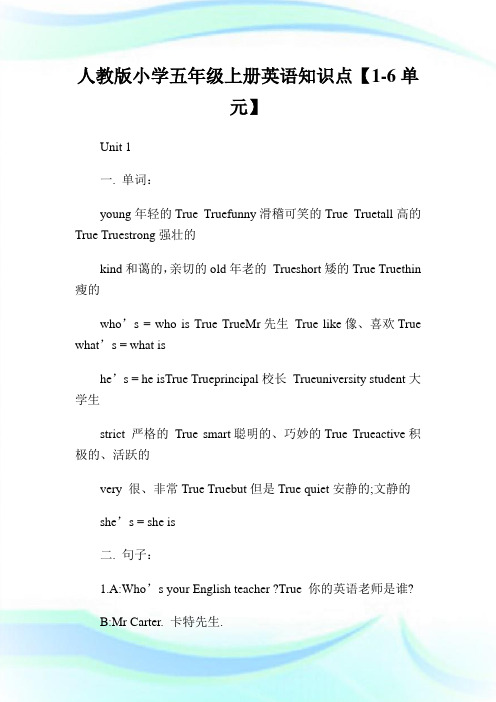
人教版小学五年级上册英语知识点【1-6单元】Unit 1一. 单词:young年轻的True Truefunny滑稽可笑的True Truetall高的True Truestrong强壮的kind和蔼的,亲切的old年老的Trueshort矮的True Truethin 瘦的who’s = who is True TrueMr先生True like像、喜欢True what’s = what ishe’s = he isTrue Trueprincipal校长Trueuniversity student大学生strict 严格的True smart聪明的、巧妙的True Trueactive积极的、活跃的very 很、非常True Truebut但是True quiet安静的;文静的she’s = she is二. 句子:1.A:Who’s your English teacher ?True 你的英语老师是谁?B:Mr Carter. 卡特先生.2. He’s fromTrueCanada. 他来自加拿大。
3. A:What’s he like ?True 他什么样?B: He’s tall and strong .True 他又高又壮。
He’s very funny.True 他很滑稽。
(Who,What引导的特殊疑问句,用来对不熟悉的老师进行问答:Who's + 某人?What's he / she like? He / She is + 与身体特征和性格特征有关的形容词。
)4.A: Who’s that young lady/? 那个年轻的女士是谁?B:She’s our principal. 她是我们的校长。
5.I have a new math teacher. 我有一位新数学老师。
6.Her class is so much fun.True 她的课非常有趣。
7.She’s a university student.True 她是一名大学生。
- 1、下载文档前请自行甄别文档内容的完整性,平台不提供额外的编辑、内容补充、找答案等附加服务。
- 2、"仅部分预览"的文档,不可在线预览部分如存在完整性等问题,可反馈申请退款(可完整预览的文档不适用该条件!)。
- 3、如文档侵犯您的权益,请联系客服反馈,我们会尽快为您处理(人工客服工作时间:9:00-18:30)。
人教版英语小学知识点总结
五年级英语上册期末总复习知识点
一.重点单词(能听,说,读,写的单词)
Unit 1
old年老的young年轻的funny 滑稽的kind和蔼的
strict严格的polite 礼貌的helpful乐于助人的
shy害羞的hard-working勤奋的clever聪明的
Unit 2
Monday(Mon.) 周一Tuesday(Tue.) 周二Wednesday(Wed.)周三Thursday(Thu.) 星期
四Friday(Fri.) 周五Saturday(Sat.) 周六Sunday (Sun.)周日weekend 周末
wash my clothes 洗我的衣服do homework 做作业watch TV 看电视read books 读书play football 踢足球
Unit 3
sandwiches三明治salad沙拉hamburger汉堡ice cream 冰淇淋tea茶fresh新鲜的healthy 健康的delicious美味的hot辣的sweet 甜的
Unit 4
sing 唱;唱歌song 歌曲sing English songs 唱英文歌曲
play the pipa 弹琵琶kung fu 功夫;武术do kung fu 练武术
dance 跳舞draw 画cartoon 漫画draw cartoons 画漫画
cook 烹调;烹饪swim 游泳play basketball 打篮球play ping-pong 打乒乓球speak English 说英语
Unit 5
clock 时钟;钟plant 植物bottle 瓶子water bottle 水瓶bike 自行车photo照片;相片front 正面in front of 在……前面between 在……中间above 在(或向)……上面beside 在旁边(附近)behind 在(或向)后面
Unit 6
forest 森林;林区river 河;江lake 湖;湖泊
mountain 高山;山岳hill 山丘;小山tree 树;树木;乔木
bridge 桥building 建筑物;房子;楼房
village 村庄;村镇house 房屋;房子;
二、一起来拼读本册课本中学到的语音及单词:
发音y/i/ baby宝宝happy开心的candy糖果windy刮风的sunny晴朗的sorry 对不起
发音/i:/ read 读书feed 喂养beef牛肉feet双脚
meet遇见tea 茶eat吃
发音/aʊ/ flower 花how 如何,怎样cow 奶牛wow 哇down 向下
发音/əʊ/slow 慢的snow 雪yellow 黄色window 窗户
发音/u/ book书look看football足球good好的cook 烹饪
发音/u:/ balloon 气球food 食物zoo 动物园noodles 面条cool 酷afternoon 下午
发音/ei/ rainy下雨的rainbow彩虹paint涂wait 等候
say 说way方向birthday 生日Monday 星期一today 今天
发音/aʊ/ house房子mouse老鼠sound 声音count数数
三、重点句型:
Unit1
1.--Who’s your art teacher? 谁是你的美术老师---Mr Jones.琼斯老师。
2.---Is he young? 他年轻吗?
--- Yes,he is. 是的,他年轻。
--- No,he isn’t.不,他不年轻。
3.---What’s Wu Yifan like? 吴一帆长什么---He’s hard-working. 他很勤奋。
4.---What’s she like? 她长得怎么样?---She’s kind. 她是亲切的。
5.Ms Wang will be our new Chinese teacher.王老师会成为我们的新语文老师。
6.He is very helpful at home. 他在家很能干。
7.He can speak Chinese and English.他会说汉语和英语。
8.He makes me finish my homework.他让我写作业。
注意:Be动词(is,am,are)用法:我用am你用are,is跟着他她它,单数用is,复数要用are。
Unit2
1.----What day is it today?今天是星期几---It’s Saturday.今天星期六。
2.---What do you have on Thursdays ?星期四你们上什么课?
--- I have math,English and music .我们上数学英语和音乐课。
3.---What do you do on Thursdays, Grandpa?爷爷,星期四你要做什么?
---I have a cooking class with your grandma.我要和你奶奶去上烹饪课。
4.---Do you often read books in this park?你经常在这个公园看书吗?---Yes,I do.是的---No,I don’t.不是
5.Look at my picture.看我的图片。
6.You look tired. 你看起来很累。
注意:(合成词)day:Monday;Tuesday;Wednesday;Thursday;Friday;Saturday;Sunday
Unit3
1..----What would you like to eat?你想吃什么?
---A sandwich,please.请给我一个三明治。
2.---What would you like to drink? 你想喝什么?
--- I’d like some water. 我想喝点水。
3.---What’s your favourite food? 你最喜欢吃什么食物?
---Noodles.They are delicious. 面条,面条很好吃。
4.My/His /Her favourite food is fish.我/他/她最喜欢的食物是鱼。
5.I’m hungry/thirsty.我饿了/渴了。
6.I don’t like beef but chicken is OK. 我你喜欢牛肉但是鸡肉可以。
注意:单复数变化规则:一般情况加s;以o、s、x、ch、sh结尾加es。
Unit4
1.------What can you do for the party,children?孩子们,你们能为联欢会做什么?
-------I can sing English songs.我会唱英文歌。
2.----Can you do any kung fu ,John ?约翰,你会武术吗
------Yes, I can. 是的,我会武术。
No,I can’t 不,我不会。
3.I can play ping-pong,but I can’t swim.我会打乒乓,但我不会游泳。
注意:1.定冠词the的用法:体育运动前不用the,乐器前面要用the。
2. some只用于肯定句,否定句和疑问句中用any.
I can do some kung fu.
I can’t do any kung fu. Can you do any kung fu?
Unit 5
1.There is a big bed.这里有张大床。
2.There are so many picture here。
这里有这么多幅画。
3.Your room is really nice.你的房间真好看。
4. My computer is here on the desk.我的电脑在这儿桌子上。
5. ----Where is the ball? 球在哪里
----It’s in front of the dog.它在狗的前面。
6. My grandparents have a garden in front of their house.我的祖父母有一个花园在房子前面。
7.There are lots of flowers in it.在里面有许多花。
注意:There is/are句型构成:There is/are + 物体+ 方位词+ 地方。
如:There is a cat in front of the table. 桌子前面有一只猫。
There are two pictures on the wall. 墙上有两幅图画。
Unit 6
1---Is there a river in the forest,Miss White?怀特小姐,森林里有河吗?----No,there isn’t. 不森林里没有河。
2.----Are there any tall buildings in the nature park?自然公园里有高楼吗?-----No, there aren’t . 不,自然公园里没有高楼。
注意:(一般疑问句)Is there a/an… ? Yes, there is. No, there isn’t.
Are there any… ? Yes, there are. No, there aren’t.。
